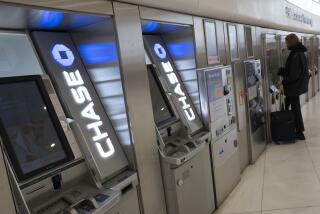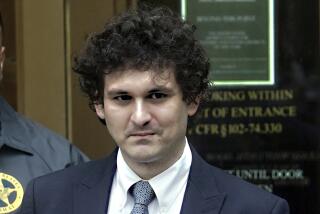BankSimple’s founders pitch an online bank with no branches and no fees
- Share via
Reporting from New York — Last fall, like so many Americans before him, Josh Reich ended up in a frustrating game of phone tag with JPMorgan Chase over a bill, this one about escalating fees and other bank errors involving his home equity loan.
FOR THE RECORD: An article in Thursday’s Business section about a new Internet banking firm said that conventional banks collect at least $24 million a year in overdraft fees. The amount is $24 billion. Also, the article said that Alex Payne was a co-founder of Twitter Inc. He is not; he was brought on as a co-founder of BankSimple.
Unlike most Americans, Reich decided to respond not by complaining but rather by contacting a friend from business school and convincing him that they could start their own bank, one that would challenge the old way of doing business.
“The idea of starting it came from the realization that banks in America make money by keeping their customers confused,” Reich said at the offices of BankSimple, as the product of that inspiration is known. “We realized that there was a business opportunity there.”
Less than a year later, Reich and his partner, Shamir Karkal, are trying to raise $3 million from venture capitalists to fund their vision.
The pitch is straightforward. A bank with no fees or branches, where all the emphasis is on creating a user-friendly electronic home for all your finances.
The site already has had some notable achievements given that it hasn’t yet set an opening date.
Last month, the founding duo snagged as their first employee Alex Payne, better known as one of the co-founders of Twitter. A few weeks later, BankSimple was named one of the 20 bank innovators of 2010 by Bank Technology News, alongside industry giants such as Citigroup Inc. and MasterCard Inc.
Reich and Karkal, who met at Carnegie Mellon’s business school, come at the job with some unusually rich credentials for a pair of 31-year-olds. Karkal, who grew up in India, was a bank consultant with McKinsey & Co. Reich, an Australian, went to medical school before working at a New York hedge fund and an online start-up that helped match mortgage lenders and borrowers.
The founder of that mortgage site, Jerry Neumann, was one of the angel investors who put a total of $140,000 in BankSimple, an investment he decided to make because of what he saw in Reich.
“He approaches things with a certain playfulness,” said Neumann, an independent venture capitalist in New York. “He regards his projects as more art than science.”
That playful approach is evident in BankSimple’s new office in a hip, former industrial part of Brooklyn, where the bank’s founders moved after working for the first five months out of Reich’s basement. Reich rides to work on his bike and walks around the office barefoot. He and Karkal have been setting up their office with neon-colored lights and Ikea furniture in preparation for the first interns arriving this summer.
The vision for the bank comes in large part from their international backgrounds in India and Australia, where most bill paying is done online and paper checks are part of the Paleolithic past.
Reich and Karkal are excited about new technological possibilities, such as using an existing application that lets customers deposit checks from anywhere by taking pictures of them with their smart phones and filing the information with BankSimple.
As it is now, Reich said: “You can tweet your friends and update your Facebook profile in seconds, but you can’t move money in less than five days. It’s a recipe for failure.”
The job they have given themselves is not an easy one. Many banks have consolidated or gone out of business since the financial crisis began, and fewer major banks have ended up with a stronger hold on the industry.
Even in good times, the banking industry is a hard one to enter because of the maze of regulations in place to protect depositors. And with competition from 8,000 existing banks, industry analysts are skeptical about BankSimple’s chances.
“They are in an extremely crowded market with lots of consumer regulations,” said Edward J. Carpenter, founder of bank consulting firm Carpenter and Co. in Irvine.
But, Carpenter said, the degree of public skepticism toward big banks provides an unusual opening.
“A succinct, clear, honest message has a better chance of being received today than at any time in the last couple decades,” he said.
BankSimple isn’t technically a bank, nor does it have plans to become one. Reich and Karkal are negotiating with existing banks to hold their customers’ deposits and make loans. BankSimple will share with those banks the typical spread in rates between the interest charged on loans and the lower interest paid on deposits.
BankSimple’s job will be to provide the front end of the bank through its website, which will detail its policies on interest rates and fees.
It is on fees where the partners are making their most direct pitch by promising to do away with all the hidden fees and overdraft charges that have angered so many customers. They will offer a line of credit for overdrafts, but it won’t be big and there won’t be a fee to access it.
Overdraft fees at conventional banks amount to at least $24 million a year, according to the Center for Responsible Lending.
Reich and Karkal’s main push will be in the technology and customer service arena, a point underscored by their decision to hire the man who was responsible for Twitter’s online platform. BankSimple is aiming for a similar pared-down site, where all of a customer’s financial data will be easily searchable and sortable.
For customer service, BankSimple will rely at first on a call center that will be set up in Brooklyn. Customers will receive ATM cards that they can use at any of 50,000 surcharge-free ATMs operated by independent systems, Allpoint Network and MoneyPass ATM Network.
Many of the innovations they are proposing have been tried in other places in some form. Perhaps the clearest predecessor is ING Direct, an American online subsidiary of a Dutch bank that opened in 2000 and quickly grew into the largest online bank in the United States.
Karkal, who has an account with ING, said the Dutch bank did not aim to provide a one-stop bank account similar to BankSimple’s plan.
What BankSimple has done so far is enough to impress Jim Bruehne, editor of the Online Banking Report.
“They certainly have this mind-set, thinking outside the box, to do some pretty cool things,” Bruehne said.






